
by bsquared5@aol.com | Jun 2, 2015 | Thoughts
Back in the day, nice young ladies of a certain standing were required to attend “finishing school,” where they learned, among other things, how to sing and play piano, I guess in case they had to regale guests in the parlor at Downton Abbey. I am woefully unfinished.
Those black lines and dots dancing across the tightrope wires–music, in other words–is an undecipherable language to me. I attend a church where it’s customary to sight-read notes and sing acapella four-part harmonies. You’re supposed to know which part you sing–soprano, alto, tenor, or bass. I apparently was absent on the day the Sorting Hat placed everyone in their proper group, so I kind of hop from part to part, depending on how late I was up the night before, or how high the pollen count happens to be that day.
Once, when I was about five, I was belting out something or other around the house when my oldest sister said, “That’s a pretty song.” I lifted my diva chin and told her matter-of-factly, “I know. I’m a very good singer. I probably sing better than—” (I searched my childish brain for the best there was) “the Virgin Mary.”
Even as I said it, I felt a stab of conscience, not from unchecked grandiosity but from saying out loud that I outshone the Mother of God. I waited for some electric current to sizzle up from the floor and zap me for my brashness. When none came, I flashed a smile at my sister’s shocked face and flounced to my room, secure in my smugness.
You know how it is at five. Boys think they have muscles like The Hulk and girls just know, if they close their eyes and wish very hard, they can be mermaids. Fast forward a few years and I was in sixth grade chorus. In the back row. And it wasn’t because I was tall. That didn’t stop me from belting out the entire soundtrack of West Side Story and The King and I with some of my artsy friends. My hairbrush microphone got quite a workout as I danced around my pre-teen room singing a soulful rendition of Olivia Newton John’s whispery ballad “I Honestly Love You.” It always sounded better with lots of lip-gloss.
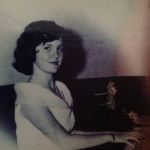
mom, at a recital
Nobody in our family played an instrument. My father came from stern German stock (No music! Eat your strudel!). One of his brothers did play the sax, but that was an anomaly and about 20 years after my father’s time. My mother had piano lessons at some point, although I never heard her play. When we visited her parents, her mother would play harmonica, sing Elvis Presley songs, and break out the banjo. I was fascinated. What were these magical devices? There was a small electric lap keyboard stashed in the back bedroom that I would pick out songs on, but only because the songbook was like a play-by-number beginner’s volume, no real musical notes on the pages.
The only halfway musical thing I remember doing growing up was when we’d pass the time on long road trips by singing a 1950’s song my mom knew called “Gonna Get Along Without You Now.” My sisters and I would sing the verses in rounds of harmony (as best we knew how), while mom would keep time by singing ba, boom, boom, booms as the bass part. We never got very far before we’d crack up at the faces she made while she sang.
Uh huh, hmm hmm
Gonna get along without you now
Uh huh, hmm hmm
Gonna get along without you now
You told me I was the neatest thing
You even asked me to wear your ring
You ran around with every girl in town
You didn’t even care if it got me down
Uh huh, hmm hmm
Gonna get along without you now
Mhm mhm, hmm hmm
Gonna get along without you now
Got along without you before I met you
Gonna get along without you now
Gonna find somebody who is twice as cute
‘Cause you didn’t want me anyhow
Years later, when I met my husband, one of the things that impressed me most was his ease with music. He was in the school choir, played piano, gui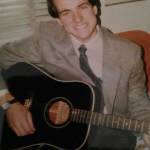 tar, and mandolin, and marched with the band playing tuba. He tried to teach me to sight-read, but mostly I liked listening to the timbre of his low bass voice, rumbling the church pew when he’d reach a really low octave. Sometimes, when he has a cold and while he still has his morning voice, I hear him pad into the foyer and hit the keys on the low end of the piano, often reaching an E. It always makes me smile.
tar, and mandolin, and marched with the band playing tuba. He tried to teach me to sight-read, but mostly I liked listening to the timbre of his low bass voice, rumbling the church pew when he’d reach a really low octave. Sometimes, when he has a cold and while he still has his morning voice, I hear him pad into the foyer and hit the keys on the low end of the piano, often reaching an E. It always makes me smile.
Because of his genes, both of our children learned to play piano, and one spent a short year at school playing clarinet in the band. For my son, music comes easy and seems to be an underlying soundtrack of his days. It is a rare day when he’s not humming or singing around the house, often without realizing it. He fills the house with his own kind of music. The other day, when teaching him to drive, I had to ask him to please quit beat-boxing and concentrate on the road. “This is how I concentrate!” he said.
I still love to jam to songs on the radio, and we do our own version of singing in harmony on long road trips. But I know I’m not destined for American Idol or even the front row of a sixth grade chorus. I have a different version of formal music lessons. Instead of practicing scales on the piano, I love to puzzle out how my son is feeling as he hums upstairs. I watch how music magically knits generations together when my husband plays in the annual Tuba Christmas concert, in a group of musicians ranging from 11 to 93 years old.
Hearing the music of those who are truly gifted is one of life’s greatest delights. I must have listened to Sarah McLachlan’s “Blackbird” five times today. Beautiful. Certain songs sung in just the right way can reach into the deep parts inside like nothing else can.
I’ll keep humming along to different parts of the church hymns without reading the music. I’m pretty positive when I enter the pearly gates, Mary will stick me on the back row of the angel chorus. Touché.

by bsquared5@aol.com | May 26, 2015 | Thoughts
It’s rainy and humid today. Translation: Make Room for the Hair. It starts out innocently enough in the morning as I carry hope like a fragile spark of life. By mid-morning, my peripheral vision has already been severely compromised, and by late afternoon, people sometimes mistake me for the drummer from Whitesnake. No amount of product is enough. Cute headbands get lost in the jungle. My kids yell at me: Mom, sunglasses are not a hair accessory. But they don’t know how it is.
My hair is a separate free-willed living organism, perched atop my body. Like Gremlins, it gets stronger and more unruly with water, sunlight, and attempts to “feed” with hair products. When I was young, my locks were so baby-fine and wispy, barrettes and ponytails would slide right out, leaving my hair to hang in my face clinging like silken spider webs. Either that or it would stand on end, with enough static electricity to power a small village. I had to get other people to open the refrigerator or car doors or I’d be thrown backwards, howling from the force of the static discharge.
 Sometime in college, things went haywire, the genetic wheel spun once more and landed on “naturally curly.” Just because something is natural doesn’t mean it’s a boon to your daily life. Colonics are naturally cleansing. You don’t really want those either.
Sometime in college, things went haywire, the genetic wheel spun once more and landed on “naturally curly.” Just because something is natural doesn’t mean it’s a boon to your daily life. Colonics are naturally cleansing. You don’t really want those either.
In the 70’s, everyone wore their hair straight, long, and parted in the middle. My three older sisters would hoard cans of baby food and juice, cut the ends off, and use them to roll their hair. No way was my father shelling out for three sets of hot rollers and expensive straighteners. They’d walk around the house with their rolled hair out to here, carefully navigating around corners with their extra-wide heads. They’d go through scores of bobby pins and endure painful nights sleeping on metal cans so their hair could be tamed and straightened perfectly. For the oldest two, this process worked great, despite the discomfort and time required. For the third, this was futile. She, too, was naturally curly. Her baby pictures resembled Shirley Temple, with long bouncy ringlets. Cute when you’re three, but not when you’re 16 in the 70’s. She eventually gave up after angry tirades before the bathroom mirror, black sulky moods, and railing at the universe for her misfortune. She wore bandanas daily to cover the shame of her cursed curls.
My mother’s locks, as long as I knew her, never crept much below her ears. Our curls came from her. She always had short, close-cut waves–and rocked sunglasses as an accessory, I might add. She was fairly no-nonsense with the beauty routine, which I supposed she had to be with so many kids. Every couple of days she’d wash her hair in the laundry room sink and occasionally pin a lock or two back with a bobby pin. That was that. Her dark color came from a box. I imagine her shaking her head at my curly-haired sister’s fuming. She was destined to have short, close-cut, wavy hair just like mom, but at 16 that must have seemed like a death sentence. Somehow, my mother managed to not take that personally.
By the time I was old enough to care, long and straight was out (which of course was what I had). Instead, we aimed for “feathers” on the side and nice, high bangs, achievable with copious amounts of AquaNet and hours with a curling iron. Mine was straight and fine in the back with a brave attempt at “wings” on either side. My bangs stuck up in front, crunchy with hairspray, like someone had run up from behind and smacked me hard on the back of the head. My mother was no help here, having had no experience with high-maintenance hair. She could not braid, twist, coiffe, or feather. It was just hair, for heaven’s sake. What was the big deal?
Which may be why, a decade or so later, when she started losing hers during radiation and chemo, she didn’t seem rattled. Rather, she got the giggles when trying on wigs and went for a long, blonde Lady Godiva number that she never could have sported on her own. She got a sensible one, too, that looked more like her everyday self, but she hardly ever wore it—too hot and itchy. More often, she just went with what it was, and her sparse, thinning, gray tufts were allowed to blow in the breeze.
Once, when she was in the hospital, I stopped by the house to clean, vacuuming the hardwood in the hallway near her bedroom. The dust bunnies had gotten out of hand, swirling and dancing into the corners. Great tumbleweeds sailed across the floor, blown by the vacuum’s exhaust. I stooped to catch one, mid-swirl, when I realized this was not dust. It was all my mother’s lost hair, hunks and fist-fulls of it, huddled in the corners and doorways like so much debris. I was glad for the noise of the vacuum. It masked the sound of my grief as I made sure to get all the baseboards and air vents, erasing the evidence of her decline.
Five years ago, cancer struck again. This time, it was a dear friend with two young children. She harbored a little more vanity than my mother had, and she despised the wispy hunks of dark hair that covered her pillow every morning and washed down the drain with her shower. She made an appointment, and I drove her to the salon, where her regular guy gave her a hug. “It’s time,” she said, and as he unfurled the drape across her and gently leaned her backwards for one last wash, I headed to the front of the building to give her some privacy. I could hear the clippers buzz as the last of her thick, dark locks dropped onto the floor. I stood in the front sobbing at the unfairness, once again glad for the buzzing noise that hid my tears. By the time she was done, I’d pulled myself together and handed her the fuzzy hat she’d brought along. “You look beautiful,” I told her, and she did, her big brown eyes shining and luminous beneath her shaved head.
Once I remind myself to look through my perspectacles, the bad hair days I contend with when it rains aren’t that bad. Sometimes I still wish for the shining smooth tresses tossed by those girls on the red carpet. Occasionally I wish my hair would grow further than my shoulders, where it hangs in waves and flips. But now when people ask Is your hair naturally like that? I smile and say I got these curls from my mom. When I’m tempted to grouse about its unruly ways, I think of her as Lady Godiva and my brave, bold friend that day at the salon. It’s just hair. It ain’t no big thing.
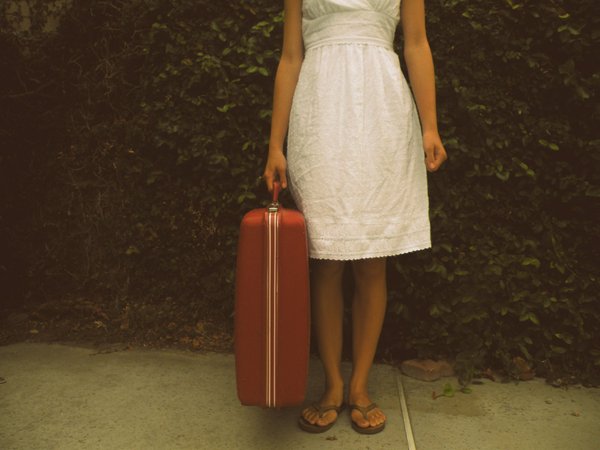
by bsquared5@aol.com | May 18, 2015 | Thoughts
My mother walked out on us once, threw up her hands, turned her back and hit the road. We didn’t blame her since we’d driven her to it; there were no more buttons left to push. She came back eventually, but there were several long, tense moments when her return was not a given. But let me start over.
I needed a break this week. Just a random, purposeless, sit still and do nothing break. These times can roll up on you until they’re suddenly breathing hotly down your neck, buzzing in your ear like a relentless mosquito. After a couple of weeks of bringing meals to school for teacher appreciation, notarizing permission slips, attacking the mound of papers on my desk for work, trying to tame the jungle yard and keep everyone fed, the late afternoon headaches would hit, and no amount of caffeine would quench the monster.
As if on cue, some sadistic, hateful person posted a serene beach picture featuring their pedicured toes in the sand, which brought on the heavy woe-is-me sighs. I’m sure this is only me—you’re probably breezily zipping along in the fast lane—one of the balls I’ve been juggling drops, or I eat one too many meals on the go. I haven’t had a meaningful conversation with my spouse in three days, and if I have to scrape up one more nasty hairball from the floor, I’m going to lose it.
I thought back to when the kids were little, days when a clean house was relative, applesauce and ice cream sounded like a good dinner plan, and I’d be lurching around the house like Quasimodo, carrying one teething baby on my hip while dragging a whiny toddler who seemed to be permanently stapled to my leg. Some days the morning hours til nap time would drag by in a blur of broken crayons and diapers, and God bless my husband who dragged in at the witching hour before dinner on days like that. Let’s just say I didn’t greet him at the door wearing pearls and a smile.
Those days weren’t always pretty. I’d stare out the Window of Despair, asking what had I done, seriously considering how much gas I had in the car and wondering how far I could get. They call these black moods postpartum depression, and happily, there’s help for that. But in the days of my own childhood, they just called it motherhood and you were expected to soldier on unaided.
Which brings me to the night my mother left. My father was on a year-long tour of duty out of the country, leaving my mother alone in the house with three teenaged girls and two young kids. This is a cruel and unusual predicament for all but the most unflappable. These were the ingredients for a perfect storm: three teenagers with synced PMS, a demanding five-year-old, and a busy toddler with a penchant for injury and going AWOL.
After 18 years of marriage and a family, my mother had finally given herself permission to take a couple of college classes, so she was trying to read actual literature and write coherent papers in between the demands of five children. Perhaps she thought she’d been a little distracted lately, but whatever the reason, she decided to take time away from her books to make a special Sunday roast beef dinner for the six of us. The table was set with the main dish, mashed potatoes and steaming hot gravy, rolls, and vegetables. Glasses were filled with iced tea and we had all gathered around the dining room table to spend some quality family time together before the busyness of a new week started.
No one remembers what started it. One of my sisters uttered some snarky teenaged remark aimed below the belt. Another sister took offense, aiming right back, and it escalated. Escalated in the sense of Hurricane Katrina starting out as a cool ocean breeze. The noxious cocktail of female hormones, a long week, and some innate death wish fermented to the point of fission. The first shot fired was a spoonful of mashed potatoes. Before my mother could scream, “What is the MATTER with you people?!” it was all out war, with hot sloshing gravy, flying green beans, vicious screaming girls, and finally, the coup d’grace: the entire pitcher of iced tea hit the wall.
The third sister snatched up my younger brother from his high chair where he screamed, wide-eyed at the mayhem. She yanked me by the hand, dragging me into the hallway, away from the flying feast, her only thought to “Save The Children!” At some point during the melee, someone must have noticed an absence. No parental intervention. No parent, period. Mother had left. The driveway was empty and an eerie and remorseful silence had befallen the dining room. Uh-oh.
Had my father been home, that would have been the end of the story. Our family would have had two fewer children as the two at fault would have been summarily executed in the backyard. As it was, they swallowed hard and cleaned up every inch of the dining room with heads hung low. My brother and I were quietly put to bed where we went without protest. The three older sisters sat somberly in their room, probably discussing options for how to pay the mortgage until dad came back.
When we woke up in the morning, she was in the kitchen making breakfast before school as usual. We found out later she’d driven to the beach and sat on the dunes. No telling how many hours she spent there, letting the sound of the waves soothe her nerves, watching the little crabs scurry in and out of their holes while she chain-smoked Tareyton 100’s. She had had it up to here and needed to remember that she loved us.
We didn’t speak of that day until years later. And it would be many more years later before my father was told, after my sisters had moved out and could ostensibly arrange their own Witness Protection.
On days when I, too, have had it up to here with whatever fill-in-the-blank calamity takes over, I remember the epic food fight story and the time my mother left. I recognize the mental red flags that signal that it’s time to bug out to salvage some sanity.
It’s okay, necessary, to take breaks. Time-outs aren’t just for two-year-olds! Walk away from the computer, arrange lunch with a friend, close the bathroom door and just breathe for a few minutes. It will not always be this way or feel like this. We are given new mercies at the start of each day. While you’re telling your kids to share and be kind, be nice to yourself, too. And for heaven’s sake, go out for dinner.
Thanks for reading! To return to the FICTION WRITERS BLOG HOP on Julie Valerie’s website, click here: http://www.julievalerie.com/fiction-writers-blog-hop-may-2016
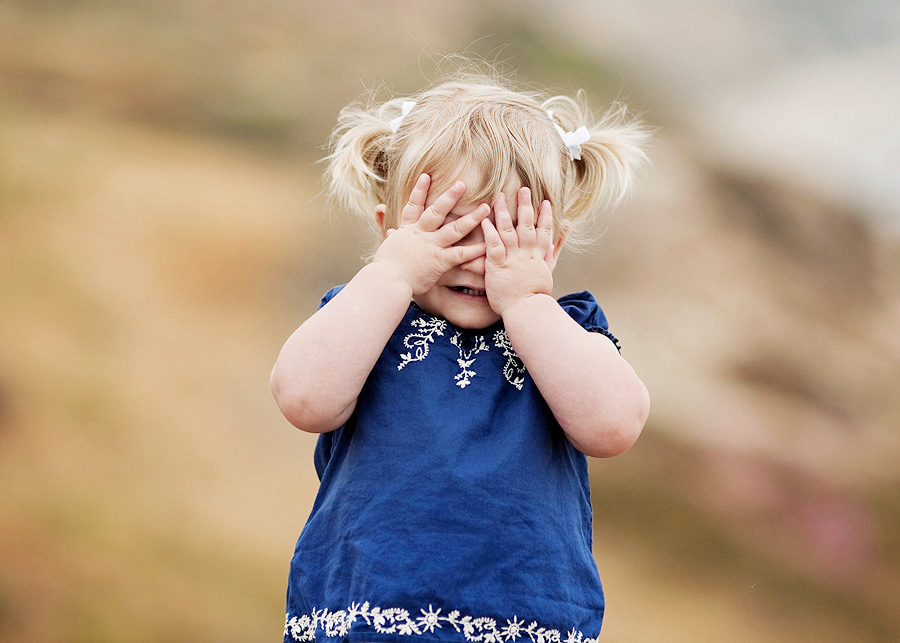
by bsquared5@aol.com | May 1, 2015 | Thoughts
A sweet video by Pandora has been making the internet rounds lately. Maybe you’ve seen it. It features several blindfolded children who attempt to pick out their mothers from a group of women. Grab a tissue, and you can see it here.
Even without seeing them, the children quickly discern this one’s mine by touch, smell, or some familiar invisible love vibe that radiates from their mothers when they draw near. Immediately after the birth of my first child, when the nurse placed the swaddled cocoon in my arms, we drank each other in. I was delighted to finally meet this little person I’d been so preoccupied with for the past nine months. “Hello!” I told her, “There you are!” as if I’d been searching high and low for just this thing. And of course I had been. She rewarded me by reaching up a wavering starfish hand and touching my cheek. Pat, pat. “Calm down, ma,” she seemed to say, “It’s just me.”
From then on with both my children it was constant drool (mine, not theirs). Memorizing, touching, and kissing each little part. The whorl of perfect ears, the flat button nose, the rounded belly and folds of baby fat in their kicky legs. I couldn’t keep my hands off them, constantly nom-nomming the soles of their feet and little sausage toes. At the end of each naptime, when they’d wake up sweaty and sleepy-eyed in their crib, it was always a fresh discovery to open the nursery door to their expectant, hopeful faces. Mom! There you are! Every time–every time–I’d open the door to find this little person waiting for me it was a surprise, as if the time lapse of nap time would have wafted this sudden role of motherhood away like white puffs of baby powder.
We are born empty vessels needing to be filled. We are born searching for connection, our eyes seeking contact, our limbs flailing nervously until they are swaddled and held.
It’s the reason children play peek-a-boo, especially endlessly, it seems, between the cracks in the airline seats on long flights. In their play, they are asking the old existential question: if I am lost, will I be found? If I disappear, will anyone notice? They test it again and again, and when they are discovered–peek-a-boo, I see you!–the giggles of delight are uncontainable and contagious.
Several of our friends have gone or are going through the process of adopting a child. There must be no greater act of human grace than this, to choose a child, wrap them tightly in love, and give them the assurance that from now on, there is someone who sees them, loves them, has found them. They matter, they belong, no matter what.
Marianne Williamson said the whole world is an orphan’s home. We are all of us waiting in the wings to be chosen, found, loved. We are lost children at Disney World, swimming in a sea of knees and strollers, spinning around wildly searching for someone who’ll rush over and hold us tight–there you are! Thank goodness I found you!
This video strikes such a chord, I think, because so many of us are dying of loneliness and our one true wish is to be discovered, treasured, and known. We have hundreds of online “friends,” but few deep connections. We are afraid to really be seen, but are craving exactly that. These questions–do I matter? does anyone see me?–dog us the rest of our lives like a black mongrel. If you are lucky, you have a mother, sister, or best friend. People who, in a crowd at the county fair, you could immediately detect in the sea of humanity, your eyes lighting on them, giving you a surge of connection, a lightness in your breath. There they are! Your tribe. They fill your vessel.
Trouble is, our holding capacity is endless. Most of us have cracks in our vessels from being dropped a time or two, kicked around and chipped. Never mind how much you may have been filled in the past, the cracks and fissures are a slow leak. Eventually, the jug will run dry, and in our fear, we scramble to plug the dike with our thumbs. This can make us mean and selfish, hoarders of joy, stingy with our supply. It is this sort of thing that makes Jesus pinch the bridge of his nose and head for the vineyard at the end of the day.
Be a seer, a finder, a filler. Deliberately take a second to make someone feel discovered, and like a miracle, the level of joy in your own vessel rises. There’s a story about hell that goes like this: everyone is seated at a banquet table, a delicious soup before them. They all have spoons but their handles are too long to reach their own mouths, so they are miserable, desperate and starving. In heaven it’s the same thing; same table, same soup, same spoons. Except here, everyone feeds someone else within their arm’s reach and no one is hungry.
Do this especially with your teenagers. See them. Find them. Remember when they were small nubbins of yummyness. When they come slouching into the kitchen grousing and moody, be happy, even delighted to see them–there you are! They are already developing hairline fissures in their cisterns and are feeling invisible, misunderstood, unknown.
Do this with the EGR people. Extra Grace Required. You know who they are. They’ve scrabbled, hoarded, and plugged for so long they’ve become desperate and would take you down with them like a person who’s drowning. See them. Fill them, even if it’s just a teaspoon at a time. They’re dirty-faced orphans, like you.
Do this with the people who seem to have it all together, living snappy crisp lives. Really see them. They sometimes work the hardest to keep it all going, and they’re tired, exhausted really; it’s endless work, all the spackling and maintaining.
Along the way, your own vessel fills. There is a secret underground spring that bubbles up from beneath. Sometimes other long-handled spoon people dose you and quench that thirst. Grace multiplies like the loaves and fishes. It fills you up, holds you over its shoulder and softly pats you on the back, there you are, there you are.
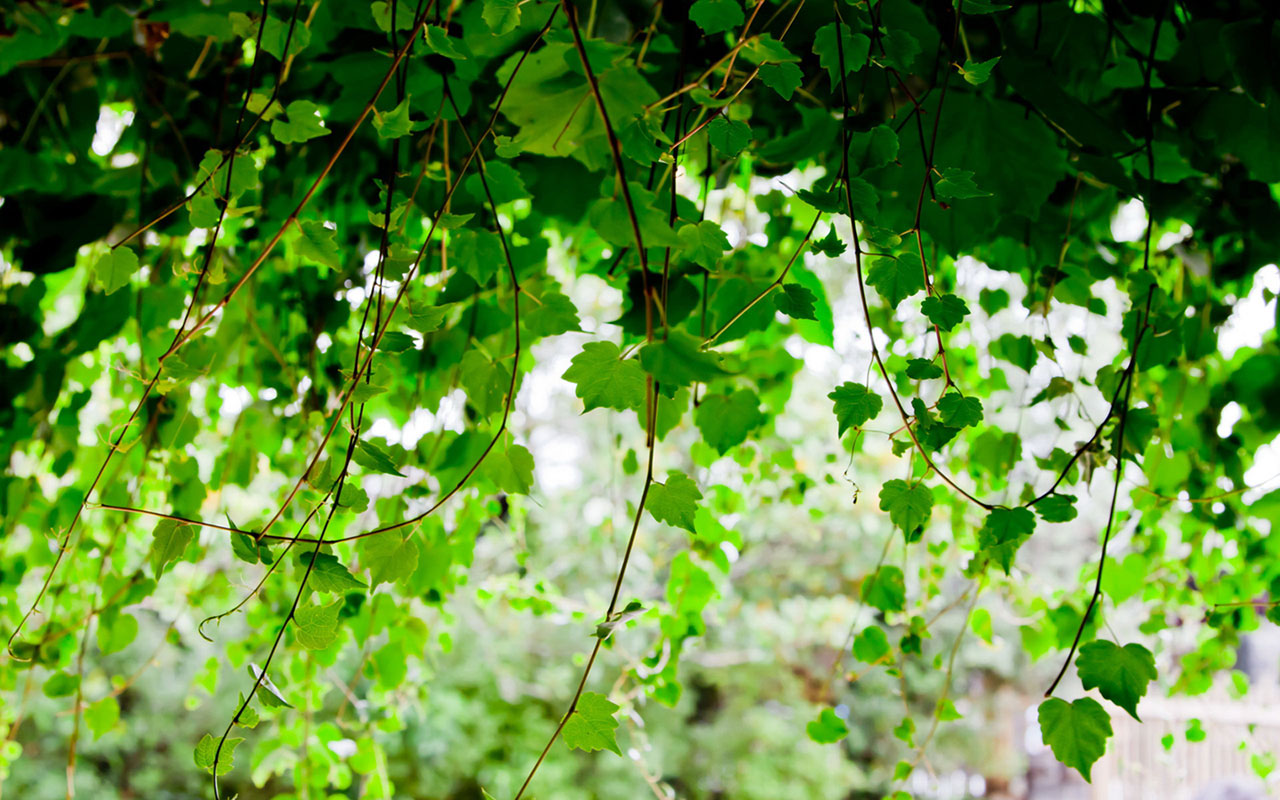
by bsquared5@aol.com | Apr 22, 2015 | Thoughts
The creeping green vines of jealousy sprout early in big families like mine. Sharing a bedroom, bathroom counter space, a bag of candy, or anything else can either make you or break you. There’s this insidious little concept of fairness that creeps into the vocabulary of even very young children. Where does it come from? Parents don’t teach it. Now, Forrest, look, your piece of cake isn’t nearly as big as your sister’s. Let mommy make it perfectly exactly measurably the same size. Let’s just weigh it on this little scale to be sure it’s equal and exquisitely-in-all-ways fair.
Yeah, no.
Maybe it’s those little labels we stick on ourselves that come from a phrase or word that may have been spoken only once out loud in our earshot: the smart one, the pretty one, the funny one, the athlete, the peacemaker. From then on, we perversely focus on the opposite, the adjectives that didn’t make it onto our particular self-label.
Once that habit takes hold, it’s easy to drift into other areas, the thing she has that you don’t, the skill or talent he’s got that you never learned. When I was about 10, a girl I knew owned the perfect storybook dappled pony that I coveted with all my being. Worse, she barely paid attention to it, rubbing salt into my ugly desirous wound. My want for that sweet pony quickly turned into open contempt for its owner. She was obviously mean, spoiled, hateful, and likely the spawn of Satan. None of that was true, of course, but pony-lust can be a burning coal of nasty.
In sixth grade it was my classmate Debbie’s boobs. She was approaching a C-cup and apparently owned only outfits that proved it. I was always a year younger than the kids in my class, which only exaggerated the differences. My chest was practically concave in comparison to hers. Nothing else about me appeared to be blooming except the thickening jealousy vines. For several years, my brother called me “mosquito bite,” a nickname he dreamed up with all the sensitivity of a bulldozer.
The trickle from the jealousy faucet was just so hard to turn off. It leaked into the fissures and crevices inside, those that were empty of all the things I wasn’t. Instead of being happy for other people’s successes, even very good friends and family, inside I was that pouty child shouting, “It’s not FAIR!” How come SHE gets to have a cool job and travel all over the world? Why does HER house look so cute and magazine-ish? SHE sits down and effortlessly writes beautiful resonating stories that get published immediately while I hunch over the keyboard chewing my fingernails to turn out spider puke.
It’s not a good place to be, that Planet Not Me. This planet is an exercise in constant comparison where the answer to everything is “not me.” Who’s skinny and perky and wears a size 6? Not me! Who’s got perfectly straight white teeth and no gray hair? Not me! Who can play a musical instrument and dance like J. Lo? You guessed it, not me. Being on this planet makes you feel low and bitter and makes you send wishes for small bad things to happen to these people you imagine lead magical, charmed lives. Just small things. I’m not a monster.
It turns you into an attention-craving comparison addict. You’re forever comparing your beginnings to other people’s middles, your insides to other people’s outsides. It’s apples and oranges, or more accurately, apples and chicken poop. The Neverland of Wishful Thinking (a.k.a., filtered look-who-I’m with-when-you’re-not Instagram shots, look-how-clever-status updates, and the look-what-you’re-not-doing on Pinterest) only makes it worse.
The good news is that you can leave that planet any time. Just hop right off and brush its dust from your feet. Certainly, there are plenty of things we are not and even more things that we cannot perform with finesse and verve like others. To dispel your inevitable idealized vision of myself, for instance, I’ll tell you that among other things, I do not eat kale, tofu, or sushi. I do not drink smoothies with or without added protein. I do not exercise thrice weekly, train for or run actual marathons, or use essential oils of any kind. In addition, my heels are not buffed, I do not wear sexy underwear on a daily basis. I sometimes let the laundry pile up, watch morning TV, and eat Girl Scout thin mints by the sleeve.
I do not know the difference between words like tulle and toile. I plant container gardens with sincere intentions that by the end of summer look like victims of radiation sickness. I occasionally make mac & cheese from a box–with powdered “cheese”–and serve it to my offspring. I have been known to fall asleep at night without cleansing, toning, and moisturizing.
I have come to own all of the Mess That Is Me, even embrace it. Instead of lamenting all of the “not me’s,” I have started hacking away at the vines (which over the decades have become Jack-and-the-Beanstalk worthy) and replanting little seeds of grace. This is how you disembark from Planet Not Me and get rid of the urge you had last week to key that girl’s car in some misguided attempt at karmic revenge for her great hair and adorable dress. My van sports a 0.0 sticker on its back window, revealing to the world my lack of half-marathon completion. I’ve had more people stop me to laugh about that in solidarity than if I’d had five 13.1’s plastered all over the back.
My seeds of grace are compliments received, spontaneous hugs from people who know me and hug me anyway, encouragement and appreciation gathered from here and there. Things that feed my soul and whisper you are enough. Sisters and girlfriends who get me and can sprinkle laughter and doses of humility into my day. It’s funny how we can go from judgy contempt in one moment to withered sniveling self-pity in the next. The whiplash of comparison is brutal.
Jealousy’s opposite virtue is contentment. And, sorry folks, but the only way to experience a virtue’s grace is to actually practice it. It may not be fair, but it’s enough.
Oh, and that scratch down the side of your car? It wasn’t me.
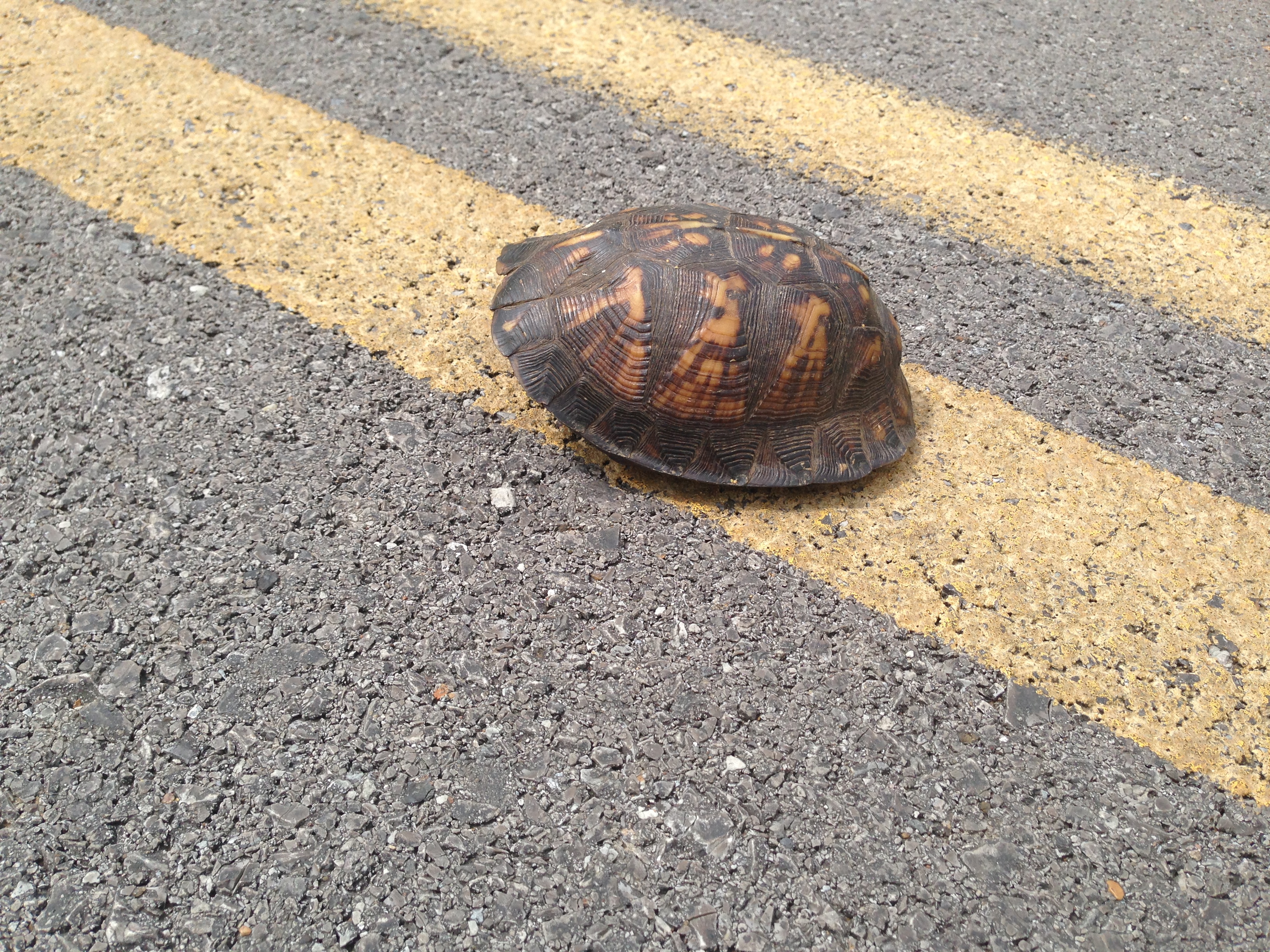
by bsquared5@aol.com | Apr 18, 2015 | Thoughts
It’s spring, which means you can hear the spring peepers singing in the April rain puddles, and turtles are on the move. As if I needed more worry in my day, for some reason they often feel the need to cross a road like the proverbial chicken. I’m that person who stops the van in the middle of the street to usher the little guys off the asphalt onto the safety of the grass. Not a big fan of reptiles, but I make an exception for the turtles.
I’m always sad when I see a crushed shell on the road, some careless driver’s handiwork. It’s not like they’re darting across like those schizophrenic squirrels on steroids: Left! No, right! Fake to the left, then dash right! You’d think the slow and careful turtles would be easy to avoid.
When the kids were smaller, I’d pull over, hop out and usually bring the turtle over to where they were strapped in so they could see its little clawed feet and its head, tucked tightly into the clamped shell. Here, we have the Eastern box turtle, with a mottled orange and green shell, and the snapping turtle, with a pointed beak and spiky shell.
Yesterday, as I was lifting turtle #374 out of harm’s way, it occurred to me how rescuing turtles is a lot like raising kids. We see our children blithely heading down a certain path, one that seems perfectly reasonable to them, but we can see a bigger picture from above, the potential for a crushed shell, so we lovingly reach down and redirect.
They tend to react in one of four ways, whether they’re toddlers or teens. Do you recognize any of these?
The Clamp Down: they see you coming and the force field goes up. Tail and feet pull in, head disappears, and the soft underbelly is protected at all costs (think teenager). Maybe if they ignore you, you won’t see them and you’ll just go away. Nothing here to see, people. Move along. You’re not getting behind that barrier without some serious artillery.
The Squirm: at your approach, they make a panicked dash for the nearest escape. If you pick them up (think toddler tantrum), they suddenly appear to have five arms and six legs, all twirling madly in mid-air. If I just move around enough, she’ll put me down and I am home free. Freedom as the only goal, they dart in a hundred different directions, without reason.
The Bodily Function: usually attempted after the Clamp Down or the Squirm have failed. This is an attempt to so totally repulse you that you just let them do whatever it was they were planning. I don’t know how many times I’ve tried to rescue a box turtle only to have it pee profusely on me (to the great amusement of my children). I choose to see it as the only gesture of gratitude they’re capable of. Peeing, burping, odors of various kinds–all are acceptable if they successfully ward you off.
The Come At Me, Bro: undisguised aggression. Leave me alone or I’ll take you down with me. I once tried to help a small snapping turtle, and that little sucker kept turning to face me in the road as I circled it, actually lunging at me to get a bite. I finally lowered myself to its level and said, Fine! Stay there if you think you know so much, and see what happens! Often this type is so determined to stay on its chosen path that you just have to cringe when the speeding truck tires straddle it and hope that it lives to get a better attitude.
When my brother was very small, my dad brought home a snapping turtle from a fishing trip. He warned my brother that this sort of turtle was always in a bad mood. My grandfather told him repeatedly that if a snapping turtle got a hold of you, it would not let go until it heard thunder. It sat in a box in the kitchen while we ate lunch. At some point, conversation halted as we all heard a crash from the kitchen. When my mother ran in to investigate, my brother stood there beside the empty turtle’s box, his blue eyes wide and innocent. “Where did the turtle go, Mike?” A silent shrug. Then a slight rustle from the trash can. A dazed turtle was trying to climb its way out of the Hefty bag.
Turns out, the temptation of that creature in the box had been too much. The moody turtle had of course bitten him when he’d tried to pick it up. Startled by the pain and the refrain of my grandfather’s warning about thunder, he’d flung the turtle across the room where it had landed in the trash.
From truck tires to trash cans, this type of turtle will no doubt have the hardest life. It seems determined to rack up as many hard knocks as possible in its refusal to accept help or do anything it doesn’t want to.
If we’re being honest, it’s not just parenting where we see these types of reactions to correction. I recognize myself in at least two of these. How often have I been the one in the middle of the road, facing an oncoming Mack truck that I don’t know is on its way, when God reaches down to lovingly redirect? Instead of being grateful, how often have I kicked and screamed, sulked and turned away, certain that I know better, in a determined attempt to stay on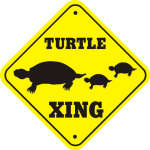 my own path?
my own path?
While I might eventually get where I am headed, how much easier and less perilous would it be to yield and be ushered there by one who has the bigger picture? With each turtle I rescue, I feel an elbow’s nudge in my side: see how easy that was? Wasn’t such a big deal, was it? It also gives me a little more empathy for my children. I get it. I know the struggle. Just another turtle crossing.

 tar, and mandolin, and marched with the band playing tuba. He tried to teach me to sight-read, but mostly I liked listening to the timbre of his low bass voice, rumbling the church pew when he’d reach a really low octave. Sometimes, when he has a cold and while he still has his morning voice, I hear him pad into the foyer and hit the keys on the low end of the piano, often reaching an E. It always makes me smile.
tar, and mandolin, and marched with the band playing tuba. He tried to teach me to sight-read, but mostly I liked listening to the timbre of his low bass voice, rumbling the church pew when he’d reach a really low octave. Sometimes, when he has a cold and while he still has his morning voice, I hear him pad into the foyer and hit the keys on the low end of the piano, often reaching an E. It always makes me smile.







 my own path?
my own path?